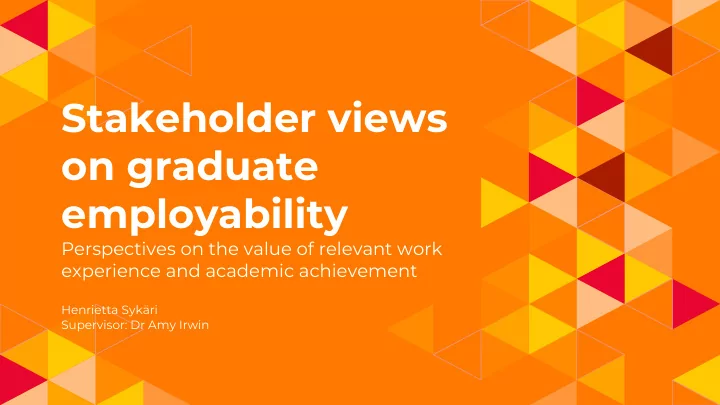

Stakeholder views on graduate employability Perspectives on the value of relevant work experience and academic achievement Henrietta Sykäri Supervisor: Dr Amy Irwin
1. Agenda 1. Introduction 2. Method 3. Results 4. Discussion 5. Takeaway message: Advice on graduate employability
Employability The concept of employability Why important in university (Hillage & Pollard, 1998) context? ◂ Gain initial employment ◂ For ¾ of students, improving job prospects is a key reason for ◂ Maintain and obtain new attending university (Sodexo, 2016) employment ◂ Recruiters’ frustration with skills ◂ Quality of employment and capabilities of current graduates 3
Perceived Employability Why perceived employability? Why work experience relevance and academic achievement? ◂ Gap between what higher education ◂ Findings of previous dissertation institutions think boosts employability and what organisations want ◂ Little research although many à e.g. recruiters value part-time work more universities suggest that relevant than students think (Kinash, Crance, Judd, & work experience can compensate Knight, 2018) for lower degree class 4
Perceived Employability Hypotheses Past research at a glance ◂ Relevant work experience ◂ CVs with low work experience and high increases employability ratings academic achievement least likely hired (Cole, Rubin, Field, & Giles, 2007) ◂ Higher decree classifications increase employability ratings ◂ Relevant work experience matters more than relevant degree to recruiters (Knouse, ◂ Academics and students place 1994) more importance on degree classification ◂ Recruiters place more importance on work experience 5
Method 132 Participants Questionnaire sent to ◂ 53 students ◂ students ◂ age m = 21, SD = 1.32 ◂ academics (social sciences) ◂ 7 female, 45 male, 1 other ◂ recruiters/employers ◂ 29 recruiters ◂ age m = 33, SD = 11.06 ◂ 18 female, 10 male, 1 other ◂ 50 academics ◂ age m = 41, SD = 9.95 ◂ 26 female, 24 male 6
Method 2 job descriptions: ◂ HR Assistant ◂ Business Management Graduate CV excerpts varied on… ◂ degree classification ◂ 1st, 2.1, or 2.2 ◂ work experience relevance ◂ Relevant or non-relevant 7
Method Quantitative items Qualitative items ◂ ”Please rate this candidate’s level of ◂ "In your opinion, how important is it employability for the position” that a graduate has relevant work experience ? Why?” ◂ ”How likely do you think that this ◂ “In your opinion, how important is it person would be hired for this role?” that a graduate has performed well ◂ 7-point Likert scale academically ? Why?” 8
Interaction between degree classification and Results work experience relevance 6 Average rating for employability For ratings of both employability (0= very low, 6= excellent) 5 and likelihood of being hired ◂ Main effect of relevance 4 ◂ Main effect of degree classification 3 1 ◂ Interaction between degree 2.1 2 classification and relevance 2.2 1 à You can set yourself apart from 0 others with a high degree Relevant Nonrelevant Work experience relevance classification and relevant work experience, but if you have relevant work experience, you’ll be fine 9
Interaction between group and relevance Results 6 Average rating for employability 5 (0= very low, 6= excellent) 4 For ratings of employability Relevant 3 ◂ Interaction between group and Nonrelevant relevance 2 1 à Students seem to place more emphasis on relevance than 0 recruiters and academics Student Recruiter/employer Academic Group 10
Interaction between group and degree classification Results 6 (0= extremely unlikely , 6= extremely likely ) Average rating for likelihood of being hired 5 4 For ratings of likelihood of being 3 1 hired 2.1 ◂ Interaction between group and 2 2.2 degree classification 1 à Employers seem to put less 0 emphasis on degree classification Student Recruiter / employer Academic than students and academics Group 11
Preliminary themes in qualitative data Recruiters are looking You can set yourself All types of work for well-rounded apart from others with experience matter individuals relevant work experience Everything depends What matters is on the type of role passion, motivation you apply for and and the ability to how willing they demonstrate them are to train you 12
Discussion Implications Limitations: ◂ Both degree classification and ◂ CV excerpts and job descriptions relevant work experience affect not representative and difficult to employability make judgments on? ◂ But recruiters care less about à E.g. Fritzsche & Brannick (2002): degree classification than you think inferences based on simplified CVs are not generalisable to inferences based on actual resumes Further analysis on… ◂ Why different interactions for different measures? ◂ Are the results different for different job descriptions? ◂ How about other disciplines? 13
1. Takeaways 1) It’s alright to focus on work experience while studying 2) It’s all about the way you sell and present yourself 3) Your personality and capabilities are important
Thank you!
References Cole, M. S., Rubin, R. S., Feild, H. S., & Giles, W. F. (2007). Recruiters' perceptions and use of applicant resume information. Screening the recent graduate . Applied Psychology: An International Review, 56 (2), 319-343. Fritzsche, B. A., & Brannick, M. T. (2002). The importance of representative design in judgment tasks: The case of résumé screening. Journal of Occupational and Organizational Psychology, 75 , 163-169. Hillage, J., & Pollard, E. (1998). Employability: Developing framework for policy analysis. Department for Education and Employment, London Kinash, S., Crane, L., Judd, M., & Knight, C. (2016). Discrepant stakeholder perspectives on graduate employment strategies. Higher Education Research & Development, 35 (5), 951- 967. Sodexo (2016). The Sodexo University Lifestyle Survey 2016, Sodexo and the Times Higher Education, London . Available at: http://view.digipage.net/00000959/00020677/00093622/ 16
Recommend
More recommend